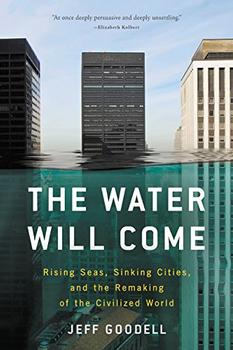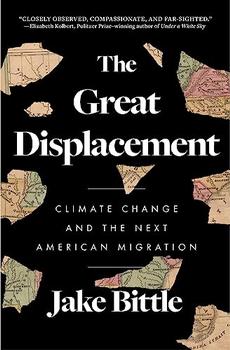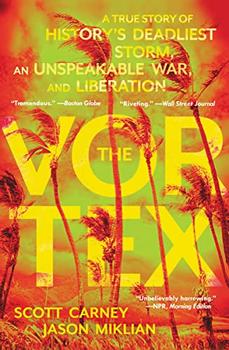Summary | Excerpt | Reviews | Beyond the book | Read-Alikes | Genres & Themes | Author Bio

Rising Seas, Sinking Cities, and the Remaking of the Civilized World
by Jeff GoodellStanding in a Manhattan neighborhood after Hurricane Sandy, Jeff Goodell, a contributing editor at Rolling Stone, smelled mold and noticed high waterlines marking shop windows. He saw trees broken, cars abandoned, businesses closed, and lots of debris. In the prologue to The Water Will Come, he says: "I have been writing about climate change for more than a decade, but seeing the flooding on the Lower East Side made it visceral for me." The book provides historical background on climate change, introduces the work of climatologists, and describes the many costs associated with rising oceans. Goodell writes, "Sea-level rise is one of the central facts of our time, as real as gravity. It will reshape our world in ways most of us can only dimly imagine."
Even if in the United States, the discussion about climate change continues to be framed as a debate, Goodell isn't arguing its validity. At one point he says, parenthetically, "if you don't believe this is happening, you are reading the wrong book." Instead, Goodell tells stories that demonstrate the challenges posed by rising sea levels, a task made more tangible by the fact that many people are already living in conditions altered by climate change. The glaciers at the poles are melting, and sea levels are rising. In fact, the oceans are rising much faster than recent climatology models predicted (See 'Beyond the Book.')
The Water Will Come opens in a dystopian, futuristic Miami with a prologue titled "Atlantis." Set in 2037, Goodell imagines a strong hurricane bringing with it a twenty-foot storm surge that pushes further inland than anyone believed possible. The salt water shorts out the electrical underground wiring and contaminates drinking water. Fears of cholera, Zika, and dengue fever are real: the damaged wastewater plant dumps raw sewage into the bay and mosquitoes begin thriving in soggy neighborhoods. Even as the city attempts to rebuild, people begin leaving. As the years go by, the water gets higher, and more and more people leave. By 2100, Miami is "where people could swim among sharks and barnacled SUVs and explore the wreckage of a great American city."
Goodell offers a historical perspective on previous changes in the Earth's climate. He rides a research vessel with oceanographers who are drilling cores of mud out of the Atlantic floor to better understand how ocean temperatures and salinity have changed over time. He notes that linguists studying Aboriginal mythology have found ancient stories that "seem to be chronicling a time when the sea was rising and the people who lived on the coasts and the islands were grappling with how to deal with it."
We follow Goodell to Alaska, to Miami, to Venice, and to Greenland where he sees the Jakobshavn glacier. Widely recognized as one of the fastest-moving glaciers on Earth, the Jakobshavn was recorded in 2012 moving at a speed of 46 meters a day. Goodell describes it as "fast and unpredictable but symbolic of changes in our world in a way that makes it difficult to ignore." As he meets scientists with various specialties in climatology, many of whom are passionate and interesting characters, we learn the basics of climatology – both what is known and still unknown.
The fundamentals of climatology are pretty easy to comprehend. As one of the more colorful scientists, Jason Box, explains: "It's not political. As the world heats up, ice melts. It's simple. It's the kind of science that everyone can understand." Where it gets complicated is in our collective psychology. As Goodell describes his interactions in meetings with lawyers, developers, and residents of Miami, he references the five stages of grief – denial, anger, bargaining, depression, and acceptance – noting that in 2013 the whole city seemed to be in denial. But, by 2016, Goodell writes, "Many Floridians have skipped over the anger stage and moved on to bargaining – especially over real estate."
Before reading this book, I wouldn't have called myself a climate denier. But I'm not as informed as I should be and was struck again and again by the significance of rising sea levels. Goodell quantifies the costs – both directly for those in coastal cities, and indirectly, for everyone else. Such fundamental change will alter industries, critically damage infrastructure, and demand humanitarian outreach. It's hard to escape the underlying premise: this is huge.
As Goodell describes proposed solutions, he considers the tradeoffs, and it becomes clear that weathering the changing climate will require us to accept, to adapt, and to work together. While it may be possible to engineer solutions – such as building walls to hold back the water, or elevating streets and buildings – the cost of such an undertaking is enormous. Further, engineered solutions don't "grapple with the political and psychological trauma of losing entire cities and coastlines."
The Water Will Come is an important book, regardless of where you live. It moves the conversation from a nebulous debate on "climate change" to a concrete set of data points that signal danger in the rising tides.
![]() This review was originally published in The BookBrowse Review in January 2018, and has been updated for the
August 2018 edition.
Click here to go to this issue.
This review was originally published in The BookBrowse Review in January 2018, and has been updated for the
August 2018 edition.
Click here to go to this issue.

If you liked The Water Will Come, try these:

by Jake Bittle
Published 2024
The untold story of climate migration—the personal stories of those experiencing displacement, the portraits of communities being torn apart by disaster, and the implications for all of us as we confront a changing future.

by Scott Carney , Jason Miklian
Published 2023
The deadliest storm in modern history ripped Pakistan in two and led the world to the brink of nuclear war when American and Soviet forces converged in the Bay of Bengal.






Your guide toexceptional books
BookBrowse seeks out and recommends the best in contemporary fiction and nonfiction—books that not only engage and entertain but also deepen our understanding of ourselves and the world around us.